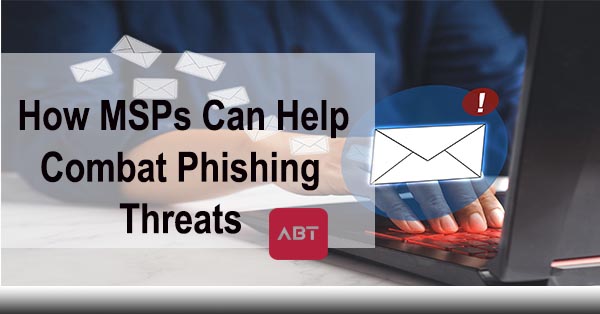How MSPs Can Help Combat Phishing Threats
Managing and securing corporate email infrastructures is a multifaceted endeavor that encompasses various strategies, tools, and practices. In this landscape, Managed Service Providers (MSPs) play a pivotal role in helping companies combat email phishing — one of the most pervasive and damaging cyber threats today. Let us delve deeper into how MSPs facilitate this protective function through several avenues.
Understanding Email Phishing
Email phishing is a cyber-attack method where fraudsters impersonate a legitimate entity to deceive recipients into divulging sensitive information like passwords, social security numbers, or banking details. These attacks often have wide-reaching repercussions, including financial loss and reputational damage. In an evolving cyber landscape, phishing techniques are becoming increasingly sophisticated, leveraging social engineering and exploiting human tendencies to make errors. Thus, proactively defending against these threats is paramount.
Role of MSPs
MSPs offer specialized services that encompass the management and monitoring of a company’s IT infrastructure and end-user systems. They work proactively to mitigate risks and respond to security incidents, providing a critical line of defense against phishing attacks.

Multi-Faceted Phishing Defense Strategies Employed by MSPs
1. Employee Training and Awareness
Simulation exercises: MSPs often conduct simulated phishing attacks to train employees in recognizing and appropriately responding to phishing attempts.
Regular updates: MSPs ensure that employees are regularly updated about the latest phishing threats and the modalities of these attacks.
2. Email Filtering and Scanning
Advanced filtering: Utilizing tools that filter emails based on various criteria, including the sender’s reputation and email content, helps in blocking suspicious emails.
Attachment scanning: MSPs employ advanced scanning technologies to scrutinize email attachments for malware and other threats.
3. Authentication and Verification
Multi-factor authentication (MFA): Implementing MFA provides an additional layer of security, making it difficult for phishers to gain unauthorized access.
Domain-based Message Authentication, Reporting, and Conformance (DMARC): MSPs help companies set up DMARC to validate that the emails originate from a legitimate source.
4. Regular System Updates and Patch Management
Updates: Ensuring that all systems are running the latest software versions with the necessary security patches minimizes vulnerabilities.
Continuous monitoring: MSPs engage in 24/7 monitoring of the network to detect and respond to any irregularities swiftly.
5. Incident Response and Recovery
Incident response plans: MSPs help in formulating and regularly updating incident response plans to ensure a quick reaction during a security breach.
Recovery: In the aftermath of an attack, MSPs assist in data recovery and system restoration, minimizing downtime and business disruption.
Legal and Regulatory Compliance
Compliance: By keeping abreast of the latest regulatory requirements, MSPs help businesses adhere to legal obligations, safeguarding them against potential legal repercussions.
Documentation: Maintaining meticulous records of all security measures and incident responses facilitates compliance with regulatory requirements.
Customized Solutions
MSPs offer tailored solutions based on the specific needs, industry standards, and regulatory landscape of each business. These customized strategies are integral in crafting a robust defense mechanism against phishing attacks.
Cost-Effectiveness
Employing an MSP is often more cost-effective than developing an in-house IT team. Companies can leverage the expertise of MSPs without the associated high costs, getting access to state-of-the-art tools and technologies.
Predictive Analysis and Threat Intelligence
Threat intelligence: MSPs often employ threat intelligence to understand the evolving threat landscape and to proactively defend against phishing attempts.
Predictive analysis: Utilizing predictive analysis, MSPs can foresee potential threats and bolster the company’s defenses proactively.
Cybersecurity Culture
Culture of vigilance: MSPs foster a culture of vigilance within the company, emphasizing the role of each individual in maintaining cybersecurity.
Feedback loops: Establishing feedback loops where employees can report suspicious emails and receive feedback fosters a collaborative approach to combating phishing.

Real-Live Examples of How MSPs Help Combat Phishing Threats
Below, we explore real instances where MSPs have proven instrumental in aiding organizations to stave off phishing attacks.
1. Training and Simulated Phishing Exercises
In 2019, an MSP specialized in healthcare IT facilitated a series of phishing simulation exercises for a large healthcare provider. This initiative not only identified vulnerabilities but also educated employees on how to recognize potential phishing emails, significantly reducing click rates in subsequent simulated phishing tests.
2. Email Authentication Implementation
An MSP implemented a Domain-based Message Authentication, Reporting, and Conformance (DMARC) policy for a financial institution, effectively reducing phishing emails by blocking unauthenticated emails, thereby safeguarding the institution’s email domain against spoofing and ensuring the legitimacy of the emails reaching the recipients’ inboxes.
3. Rapid Response to Phishing Incidents
In the face of a sophisticated spear-phishing attack targeted at a manufacturing firm in 2020, an MSP acted swiftly, identifying the breach and isolating the affected systems. Their rapid response helped to prevent further data loss and maintained the company’s operational integrity.
4. Leveraging AI for Phishing Detection
An MSP incorporated Artificial Intelligence (AI) tools into the security infrastructure of an e-commerce company. These tools were configured to analyze incoming emails for phishing indicators continuously, such as malicious URLs and attachments, effectively reducing the number of phishing emails that reached the employees’ inboxes.
5. Implementation of Multi-Factor Authentication (MFA)
An MSP helped a mid-sized law firm implement MFA, adding an additional layer of security that protected the firm’s confidential client data even when passwords were compromised in a phishing attempt.
6. Ensuring Regulatory Compliance
An MSP guided a pharmaceutical company in adhering to stringent industry regulations by enhancing its email security infrastructure to combat phishing effectively. This not only fortified the company against phishing attacks but also ensured it remained compliant with industry regulations, thereby avoiding potential legal repercussions.
7. Business Email Compromise (BEC) Prevention
In a notable case in 2018, an MSP helped a real estate company recover from a Business Email Compromise (BEC) attack. Post-recovery, the MSP implemented stricter email verification processes and regular training sessions, significantly reducing the chances of future BEC attacks.
8. Secure Email Gateways
In 2021, a renowned MSP helped a university install secure email gateways equipped with advanced threat protection features, offering real-time protection against phishing attempts and reducing the burden on the university’s IT department.
9. Enhancing User Reporting
An MSP developed a user-friendly reporting system for a retail company, enabling employees to easily report suspicious emails. This system fostered a proactive cybersecurity culture, with the rapid reporting of phishing emails helping to prevent several potential breaches.
10. Threat Intelligence and Predictive Analysis
Utilizing threat intelligence and predictive analysis, an MSP helped a government entity to identify potential phishing threats before they materialized, allowing for preemptive measures to be taken, thereby avoiding a series of targeted phishing attacks.
In these examples, MSPs have utilized a range of strategies and technologies, from training and awareness programs to advanced email authentication techniques and AI-powered tools, to help organizations protect themselves from phishing threats. Their proactive and responsive approaches have proven effective in various industries, showcasing the indispensable role of MSPs in combating email phishing in the modern business environment. By leveraging the expertise of MSPs, companies can build resilient defenses against phishing threats, safeguarding their sensitive data and maintaining their operational integrity.
Conclusion
In conclusion, MSPs play an indispensable role in helping companies combat email phishing through a comprehensive and multifaceted approach. By orchestrating strategies that encompass technology, human resources, and processes, MSPs offer a robust defense against phishing attacks.
Not only do they implement cutting-edge technologies and maintain system health, but they also work on fostering a vigilant and informed workforce capable of recognizing and averting phishing attempts. Moreover, their role in ensuring regulatory compliance and offering cost-effective solutions makes them a valuable ally in the contemporary business landscape.
By nurturing a cybersecurity culture and focusing on both preventive and responsive strategies, MSPs aid in building resilient organizations equipped to face the ever-evolving threat of email phishing. Engaging the expertise of an MSP is not just a strategic decision but a requisite in a digital age marked by sophisticated cyber threats.

